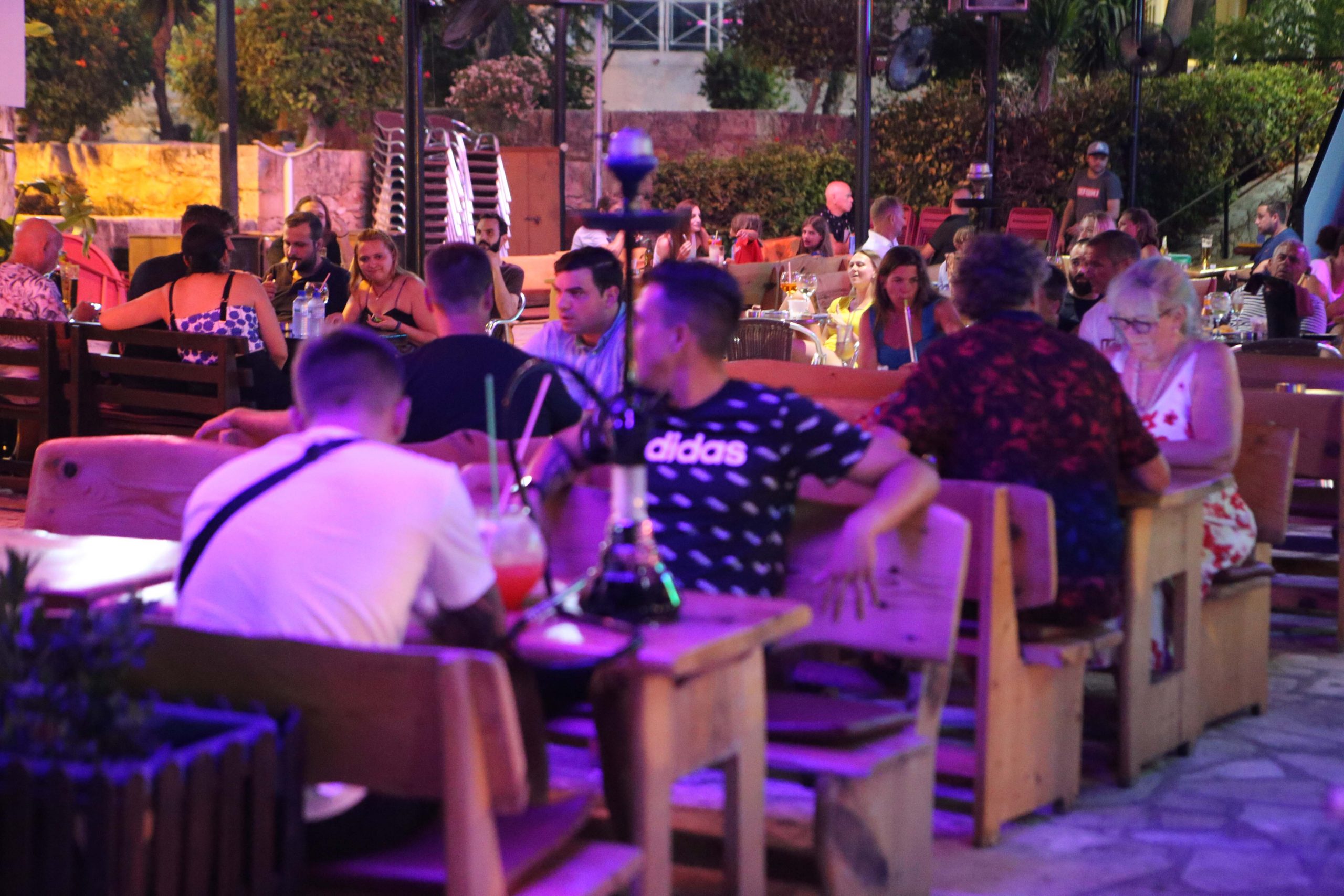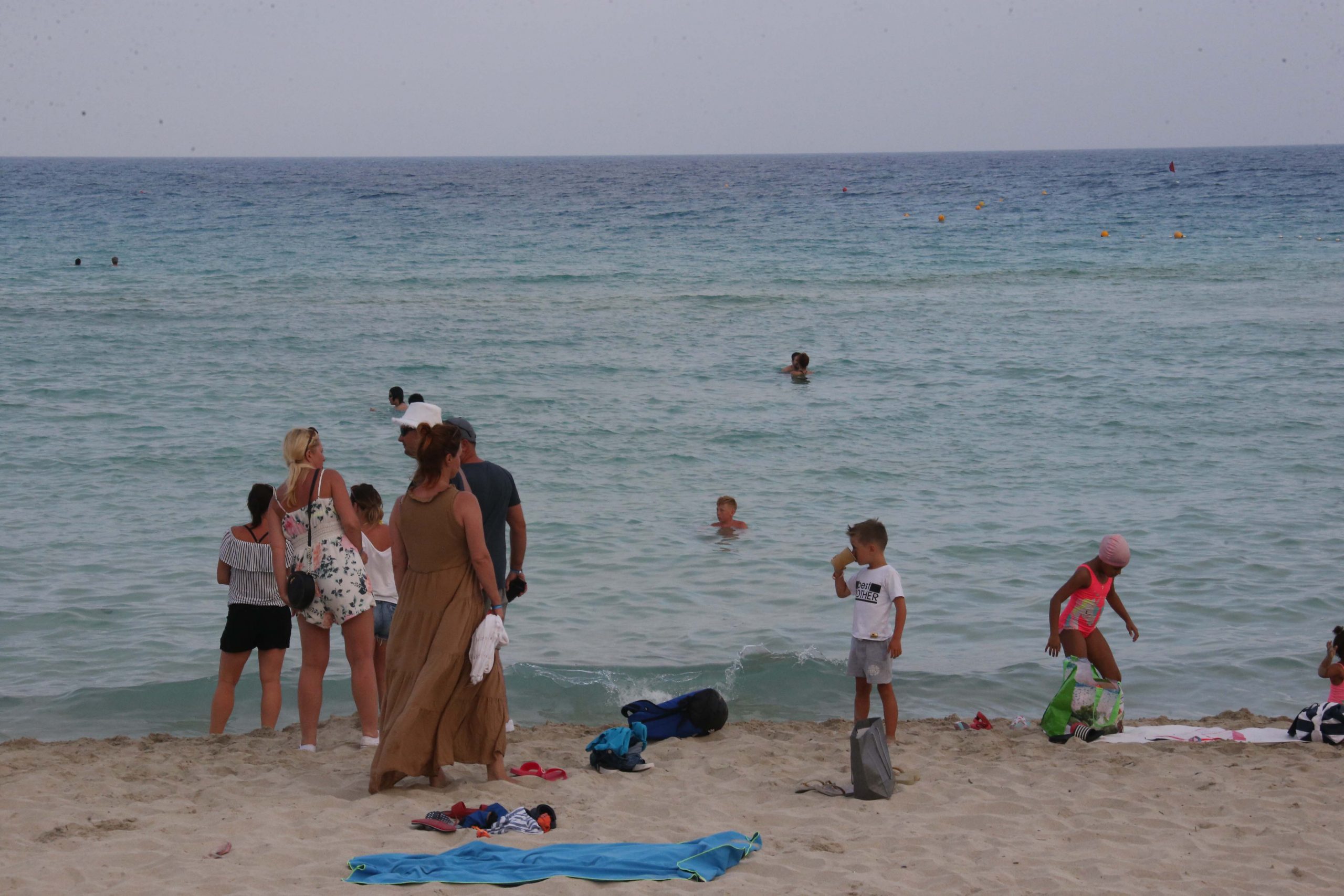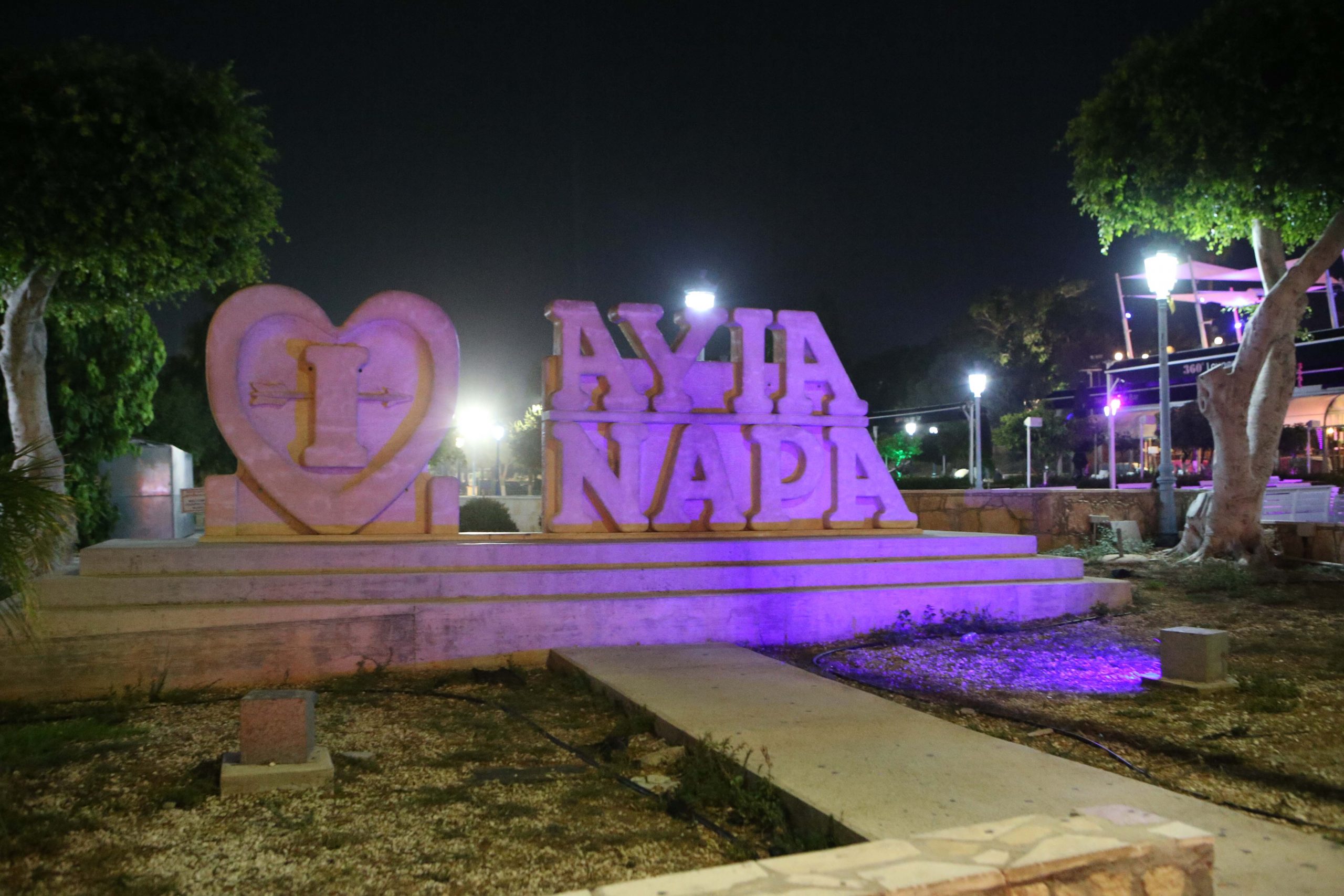A tale of two Napas. After years of avoiding their busiest resort, Cypriots have reclaimed Ayia Napa this summer. But it’s not enough
It was sundown last Saturday night in Ayia Napa and only two bars were open in the party town’s central square – but Mauro and his two friends, all Swiss nationals in their 20s, sounded like they were in paradise.
“We came to Cyprus for the first time last week for three days and had to go back for work. But it was so good we flew back to Ayia Napa two days later,” Mauro said. “We’re flight attendants and have flown all over the world – from Miami to Tokyo – but we never found anywhere so amazing. The people here are so friendly.”
The cheerful Swiss trio said the resort’s beaches were a major attraction.
“We went to four or five of them and each one was more beautiful than the one before,” Mauro told the Sunday Mail.
On the usually suffocatingly packed Nissi beach, meanwhile, Cypriot families, many for the first time in years, staked their claim to large open spaces along the shore, sunbathing in peace.
One such family, from Nicosia, was basking in the absence of mass-tourism.
“We hadn’t been for many, many years. Basically, since I was 18 I’ve been once or twice I think. After lockdown though I’ve come here five times,” Christos, 52, told the Sunday Mail.
This year, the year of coronavirus, it’s a tale of two Napas.
First, there is the Napa of the British and Russians, still virus stricken. That Napa is dead.
The heaving, deafening nightclubs circled around the central square, remain closed as part of the restrictive measures to stop the spread of the virus. But even if they were not closed by law, there would be little point in opening. Certainly, most of those bars which focus on special deals on drinks, their promotion women, their illegal sales of laughing gas – usually packed with young Brits – know there is no reason to open, even though they could. Street after street in this area are lined with shuttered souvenir shops, restaurants, clubs and bars.
And as for the hotels.
“It’s difficult to say exactly how many hotels are open because the situation is changing day to day, but right now about 50-55 out of 200 hotels are open,” Lakis Avramides, manager of the Ayia Napa and Protaras tourism board, told the Sunday Mail.
The second Napa is the Napa of the Cypriots, permanent residents and individual tourists from category A, or safe, countries. That Napa is doing well, on weekends at least. After years of avoiding it, Cypriots have reclaimed their busiest resort, lured by empty beaches and enjoying the cafes, restaurants and bars – the ones that are open – along streets now largely free of any displays of drunken British exuberance.
Last Saturday night, the Hard Rock café at the cross-roads between the square and the road to the harbour, was packed – all three storeys of it.
This Napa provides the slightest of solace to those in the hospitality industry, which is reeling from official predictions that this year’s tourist arrivals will not even reach 25 per cent of last year’s.
Hopes of a late British invasion come August 1 are not high. That is the date when the government is poised to green light flights from Britain by moving it from category C into category B, allowing visitors but only if they have a negative coronavirus test 72 hours before arrival. Big UK tour operators announced this week, however, that they would not bring travellers to Cyprus unless the UK was moved into category A, those countries which need no tests.
The most that bar owners, hoteliers and even the Orthodox priest in Ayia Napa are hoping for is a modest British incursion.
Otherwise, those in the tourism industry say, it will be a “lost summer”.
“Do I like the Brits?” said the manager of a taxi office in Ayia Napa. He paused, trying to put what he says next diplomatically, knowing that he’s speaking to an English language newspaper. “To be honest, I like their money,” he said with a smile. “I want my business to run.”
Near Ayia Napa’s famous monastery, I ran into Father Vasilios.
“All people in Cyprus, especially in Ayia Napa need the tourists to work and continue living their lives,” he said solemnly.
“It’s all a chain intricately linked together, from a simple delivery man, a waiter, cleaner, chef to the business owner or hotel owner it’s all linked, and people are interdependent.”
His mind is fixated on the ordinary people, those who need tourism back more than most.
“Do you know what it means for a whole family to be struggling without a single person working? We pray that business returns to normal. When people have children, rent and other obligations…” he trailed off.
And what does this mean for the community in Napa, I wondered.
“No, no, it’s not just the community exactly. It’s about everyone who is here – the workers from Greece, Romania, Bulgaria and everyone else, the political asylum seekers,” he said.
“We have been cooking here at the church daily to help feed the people who are out of work, it’s for everyone – not just the Cypriots but also our brothers and sisters from other countries who are here and suffering. Do you know how many tonnes of potatoes we are getting through a day?”
It was time to check in at the Nelia Gardens hotel and speak to the manager, Angelos Nicolaou, who had promised me an interview.
Nelia Gardens is nestled between the central square and the beach, just five minutes on either side.
“Within about 100 square metres there are three hotels with 650 rooms, all closed up and some not planning to open at all this summer,” he said.
He outlined two main challenges, amongst the many others, which are fuelling a “tragic situation” which has left 70 per cent of hotels closed.
“Our main markets are Britain and Russia, they account for about 80 per cent. Brits will supposedly come from August 1, but I see this as unlikely – who will go through all the hassle? And Russia isn’t even really being discussed as an option.”
He noted that the A-list, or safe countries, are not those from which Cyprus typically gains traction amongst tourists and tour operators are unlikely to link them up with the island.
Instead, most tourists are finding their destinations and accommodation through booking.com.
Deputy Tourism Minister Savvas Perdios on Wednesday said that A-list countries are improving in terms of individual tourism, noting that 2,000 Germans and 2,000 Swiss came to the country in the first week of July.
But all agreed this is a drop in the ocean.
The burning question on the lips of many is whether local tourism could make up for some of the loses.
The short answer is “no”.
“This year everything is upside down,” Nicolaou said.
“Right now 95 per cent of our customers are Cypriots whereas last July 90 per cent were foreign tourists. There are some periods in August when Cypriots account for more, but we’ve never seen anything like this.”
We were talking at a covered area near the swimming pool as young kids were being taught how to swim by their parents to squeals of delight.
On the weekends there are only about 20 rooms, out of 90, occupied. On weekdays, he said, there’s only three or four. The other hotel which the company owns, with 200 rooms, is closed entirely.
“The students really help out with the economy, now they’re all back and going to restaurants, cafes. At some of the beaches we’re even seeing an increase from Monday-Thursday compared to last year even and that’s the students that are back in Cyprus.”
But day-trippers to the beach aren’t leading to an increase in hotel bookings.
“For me, the biggest social problem which exists at the moment is the hotel workers, staff. They have stopped work since October 2019 and if the hotels which are closed don’t open they won’t go back to work until April 2021.”
Avramides from the tourism board warned that matters could get even worse unless tourism picks up and more hotels will be forced to close their doors.
Cyprus, and Ayia Napa in particular, has long been keen to decrease dependence on the British market and to attract visitors from other well-heeled countries.
Could this be the catalyst for change?
Those few bars open on the main square last Saturday were operating at about 10-20 per cent capacity.

Only one was full, the Square Bar, and the manager Angelos had a lot on his mind.
“All these people are bullshitting when they say they depend on the Brits, that’s their own fault for focusing on only the easy option and not making an effort with the Cypriot market, a good business man will find ways around a difficult situation,” he said emphatically.
He was loud and clear above the live music.
One of the main points he repeated was that businesses in the area are used to taking advantage of British tourists, instead of building ties with possible Cypriot customers.
“Why aren’t businesses treating the Cypriots better? 160 euros a night for a hotel room? How is a Cypriot going to take his family there?”
We were standing outside the bar in the central square with a few people walking past, a far cry from scenes in previous years reminiscent of Pleasure Island from Disney’s Pinocchio.
“Look at this guy,” he said, pointing to a well-dressed man in his mid-20s.
“He’s got a bit of money. He wants to spend something with his girlfriend but why charge him 160 euros? The hotels should put them up for 50 euros a night.”
There could be internet check-in, he said, saving on staff and other costs.
“Anyway, what if the Brits were to come? The bar is already basically full. The issue for me is the coronavirus measures, not a lack of Brits. If they came, I’d just get fined. The rent is 70,000 euros [a year], I don’t need fines.”
In the last few years more upmarket restaurants, bars and shops catering to wealthier Cypriots and Russians have opened up Ayia Napa mayor Christos Zannetou told the Sunday Mail.
“Year by year we see a greater number of such businesses opening up here and Cypriots coming to Ayia Napa has helped,” he said.
But the manager of Square Bar is unconvinced that the tourism model will really change.
“The businesses here still aren’t really thinking of working with the Cypriots, they’re waiting out for the Russians and others in August or September.”
But what about all the closed hotels, bars and taxi drivers without business, surely they need the Brits?
“The bar over there can’t open because there’s no tourists, he chose to work with just the Brits but that was his choice. He wanted the quick and easy option.”
Practices have to change and businesses adapt he said.
Angelos points out that he’s not doing open bar deals this summer as there’s no market for it. He’s also investing in live performances.
In the meantime, Cypriots and permanent residents are revelling in the peace.

Back on Nissi beach is a Russian family, permanent residents in Nicosia.
“It’s wonderful! We’ve been here in Cyprus for three years and it’s the best we have ever seen at the beach,” Yevgeny, 45, said.
He was crowded around by his three young daughters – all donning swimming masks and snorkel gear.
“The best!” one chirped, doing the thumbs-up.
Just one hour from Nicosia, Yevgeny explained, “and we are at this amazing beach, parking no problem and then we can go to a fantastic restaurant.”
Happy to hear the positive reaction and enthusiasm, I asked two couples sat another 10 metres further down what it all meant to them.
“We’re making the best of a bad situation. For us it’s excellent because there’s space and it’s nice compared to other years but we know what it means and why it is like this,” said Maria, 42.
“It is also incredibly sad because you know there are many people out of jobs and to see Napa basically closed means something very bad has happened,” she said.
A sobering thought – a peaceful retreat to Nissi beach for the city folk once every other weekend sounds idyllic. But who bears the cost of it all when they all go home?
“On a Saturday thankfully, there is custom but during the weekdays I would say 90 per cent of businesses are closed,” said Zannetou
“Napa is a dead place from Monday-Thursday,” said the manager of the taxi rank.
And what happens if life hasn’t gone back to normal by the summer of 2021?
“We’ll all go back to growing potatoes,” one hotelier joked.


















0 Comments:
Yorum Gönder